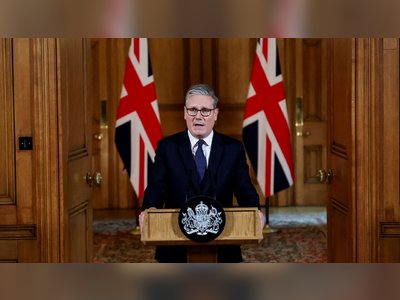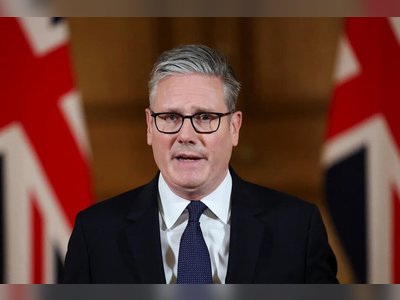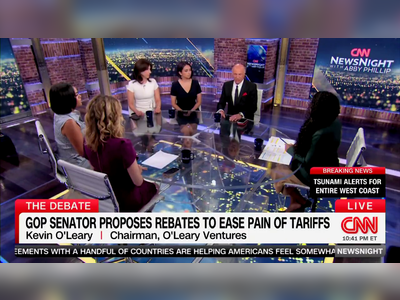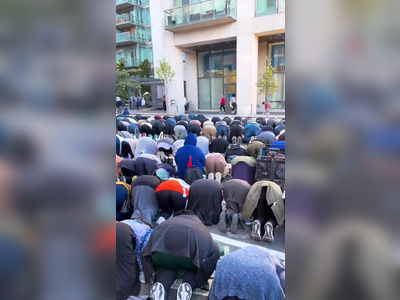0:00
0:00
US Casts Vote with Russia Against UN Resolution Denouncing Invasion of Ukraine
In a surprising turn in diplomacy, the United States joins forces with Russia in opposing a resolution that highlights the increasing international dissatisfaction with the invasion of Ukraine.
In a notable change from its previous positions, the United States aligned its vote with Russia on Monday against a United Nations resolution that condemned Moscow's invasion of Ukraine.
This resolution was viewed as a significant reflection of global opinion on the ongoing conflict, which has now reached its third year.
Predominantly supported by European nations, the resolution received 93 votes in favor, 18 votes against, and 65 abstentions.
The U.S. choice to oppose the resolution alongside Russia, Belarus, North Korea, and Sudan highlights a marked shift in President Donald Trump’s stance on the Ukraine conflict, signaling an end to a prior warming of relations with Russia.
The resolution explicitly criticized Russia's conduct in Ukraine and underscored the necessity of honoring Ukraine's territorial integrity and sovereignty.
In the context of escalating tensions between Trump and Ukrainian President Volodymyr Zelensky, the U.S. proposed an alternative resolution, which has faced backlash from other countries.
France specifically called for amendments to the U.S. draft, demanding the inclusion of the phrase “full-scale invasion of Ukraine” and reaffirming support for Ukraine's territorial sovereignty, which was absent from the U.S. proposal.
Countries backing Ukraine, particularly in Europe, expressed their inability to support the U.S. proposal in its original form, leading to significant changes.
Hungary, led by Prime Minister Viktor Orban, one of Europe's most pro-Russian figures, voted against these amendments.
The final version of the resolution approved by the General Assembly maintained strong language denouncing Russia while emphasizing the importance of upholding Ukraine's borders, which have been a key focal point in past UN resolutions mainly endorsed by the U.S. during former President Joe Biden's administration.
Just before the vote, Dorothy Shea, the U.S. envoy to the UN, remarked, "Neither these amendments, nor the resolution proposed by Ukraine will stop the killing. The UN must stop the killing," urging all Member States to focus on restoring the UN's fundamental mission of international peace and security.
Following the General Assembly's decision, the United States is expected to present its original text to the UN Security Council for a vote later that same day.
A U.S. State Department official mentioned that the U.S. would exercise its veto power against any amendments put forth by Russia or European nations.
According to UN procedures, resolutions submitted to the Security Council must garner at least nine votes from the 15 members and cannot be vetoed by any of the five permanent members, which include the U.S., the UK, France, Russia, and China.
Even if the EU members on the Council—France, Slovenia, Denmark, and Greece, along with the UK—were to abstain, the U.S. resolution could still be approved.
This scenario poses a challenge for France and Britain, possibly forcing them to make difficult decisions regarding the use of their veto powers for the first time in over thirty years as their leaders, Emmanuel Macron and Keir Starmer, are in the U.S. for important talks about Ukraine.
UN Secretary-General Antonio Guterres has emphasized the need for a peace approach that fully respects Ukraine's territorial integrity and complies with the principles outlined in the UN Charter.
This resolution was viewed as a significant reflection of global opinion on the ongoing conflict, which has now reached its third year.
Predominantly supported by European nations, the resolution received 93 votes in favor, 18 votes against, and 65 abstentions.
The U.S. choice to oppose the resolution alongside Russia, Belarus, North Korea, and Sudan highlights a marked shift in President Donald Trump’s stance on the Ukraine conflict, signaling an end to a prior warming of relations with Russia.
The resolution explicitly criticized Russia's conduct in Ukraine and underscored the necessity of honoring Ukraine's territorial integrity and sovereignty.
In the context of escalating tensions between Trump and Ukrainian President Volodymyr Zelensky, the U.S. proposed an alternative resolution, which has faced backlash from other countries.
France specifically called for amendments to the U.S. draft, demanding the inclusion of the phrase “full-scale invasion of Ukraine” and reaffirming support for Ukraine's territorial sovereignty, which was absent from the U.S. proposal.
Countries backing Ukraine, particularly in Europe, expressed their inability to support the U.S. proposal in its original form, leading to significant changes.
Hungary, led by Prime Minister Viktor Orban, one of Europe's most pro-Russian figures, voted against these amendments.
The final version of the resolution approved by the General Assembly maintained strong language denouncing Russia while emphasizing the importance of upholding Ukraine's borders, which have been a key focal point in past UN resolutions mainly endorsed by the U.S. during former President Joe Biden's administration.
Just before the vote, Dorothy Shea, the U.S. envoy to the UN, remarked, "Neither these amendments, nor the resolution proposed by Ukraine will stop the killing. The UN must stop the killing," urging all Member States to focus on restoring the UN's fundamental mission of international peace and security.
Following the General Assembly's decision, the United States is expected to present its original text to the UN Security Council for a vote later that same day.
A U.S. State Department official mentioned that the U.S. would exercise its veto power against any amendments put forth by Russia or European nations.
According to UN procedures, resolutions submitted to the Security Council must garner at least nine votes from the 15 members and cannot be vetoed by any of the five permanent members, which include the U.S., the UK, France, Russia, and China.
Even if the EU members on the Council—France, Slovenia, Denmark, and Greece, along with the UK—were to abstain, the U.S. resolution could still be approved.
This scenario poses a challenge for France and Britain, possibly forcing them to make difficult decisions regarding the use of their veto powers for the first time in over thirty years as their leaders, Emmanuel Macron and Keir Starmer, are in the U.S. for important talks about Ukraine.
UN Secretary-General Antonio Guterres has emphasized the need for a peace approach that fully respects Ukraine's territorial integrity and complies with the principles outlined in the UN Charter.











